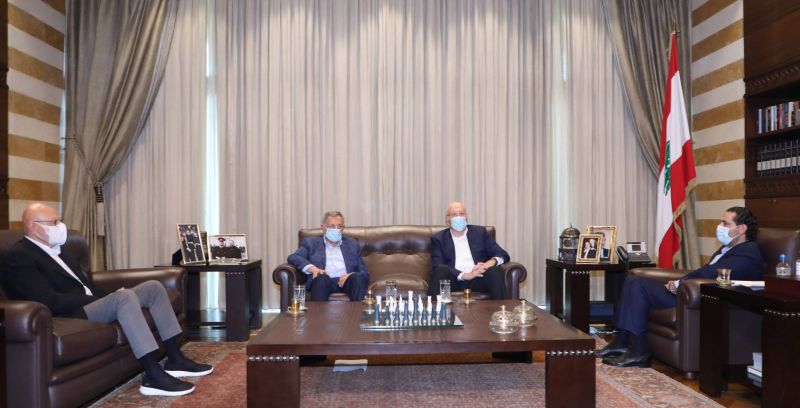
MP Najib Mikati (second right) meets with other Lebanese former premiers. Mikati seems likely to be named prime minister on Monday during binding parliamentary consultations. (Credit: Dalati and Nohra)
Want to get the Morning Brief by email. Click here to sign up.
Parliamentary blocs are set to head to Baabda today to select a new prime minister. Local media reports indicate that former premier and current MP Najib Mikati is the favorite candidate for the post. The prime minister–designate will be tasked with forming a cabinet capable of implementing reforms needed to address Lebanon’s multiplicity of crises and unlock international aid to the country. Lebanon has been without a government for nearly a year, since Hassan Diab’s cabinet resigned following the Aug. 4 port explosion. In the time since, two designated prime ministers have failed to form a cabinet amid sustained political gridlock.
The caretaker energy minister signed an agreement with Iraq on Saturday for 1 million tons of fuel oil. Raymond Ghajar estimates that the deal will be sufficient to provide four months’ worth of electricity to Lebanon, although it will be spread out over a year. The fuel, which could begin arriving as early as next week, is badly needed as the country continues to suffer lengthy blackouts. Private generator owners, suppliers of an increasingly crucial source of electricity for Lebanese left in the dark by the state utility company, are also cutting back energy provision due to diesel shortages at the official, subsidized rate and high prices on the black market. Local merchants took to the streets in Saida over the weekend to protest electricity shortages that are making it difficult for them to stay open.
Employees of the National Social Security Fund are intensifying their strike, now in its third week. The workers will expand their strike from two days a week to three days a week, working only on Monday and Wednesday. Representatives of the workers say further escalation measures will be considered if the workers’ demands for higher pay and access to fuel are not addressed. The NSSF’s director-general, Mohammad Karaki, told L’Orient Today that even though the strike is “dangerous to the interests of the people,” the NSSF’s board needs to be understanding of the workers’ plight and enable them to continue working for the administration without being forced to leave for other jobs.
Today is the first day of official exams for high school students in Lebanon. Over the past few weeks, dozens of high school students have protested outside the Education Ministry and the houses of the caretaker prime minister and caretaker education minister, calling for the cancellation of the baccalaureate exam, which students must pass to begin university. They point out that the pandemic and the country’s economic crisis have disrupted the school year. The exam necessary to begin high school, the brevet, was canceled earlier this month, but the baccalaureate was not, unlike last year, when both exams were canceled.